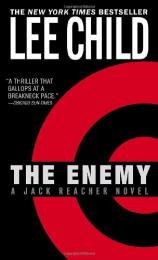The Enemy
Review
The Enemy
Jack Reacher is back! Way back, to New Year's Eve, 1990. Lee Child,
creator of Jack Reacher and author of THE ENEMY, said in an
interview, "Reacher fans always have two questions: What made him
the way he is? And what on earth was he like way back when he was
still in the Army? So … THE ENEMY … is set in the past,
when [he] was a younger man, still an M.P." This is the eighth
addition to the popular series, and of his hero Child says that
he's "a drifter and a loner with a strong sense of justice. He
shows up, he acts, he moves on. He's the type of hero who has a
long literary history. Robin Hood, the Lone Ranger, Aragorn from
The Lord of the Rings … they're all part of the same heroic
family. Reacher just ratchets it up a notch." And in order to
please readers and fans, Child believes that a great opening
chapter makes or breaks a novel. And true to his literary
philosophy, THE ENEMY grabs the reader right from the start and
doesn't let go.
At the end of December 1989, into New Year's Eve, 1990, Major
Reacher and nineteen other men of his rank are suddenly transferred
from their posts to take temporary command of other bases around
the world. Reacher had been in Panama where he "was supervising the
Noriega process, and the next day [he's] in North Carolina [at a
base named] 'Bird'." Noriega is supposed to stand trial in the
States. He and his fellow officers were "supposed to grab him with
some kind of formality … some way that will look acceptable
when [he's brought into] a courtroom."
At the stroke of midnight his phone rings --- "it was a civilian
cop calling because he had a dead soldier in a motel thirty miles
off post." Reacher asks a lot of questions, and when he is
satisfied with the answers he tells the cop to "call post
headquarters … [and] give[s] him the number." Eight minutes
later he is told that someone "shuffled it off to someone else
… because the dead soldier in question [was] a two-star
general." Reacher makes the trip to the "rent-by-the-hour," no-tell
motel and wonders "why a two-star general … would … use
a place like this?" As he takes in the entire scene and pauses for
a close look at the body he realizes why this general chose "a
low-rent dive near a highway interchange with a truck stop and a
strip bar, thirty miles north of the base." He was with a hooker
who ran away and his briefcase was missing. A few hours later the
General's wife is found in their home, definitely a victim of
homicide.
Then the body count continues to rise. A private on night patrol
reports a dead man within the perimeter of the camp. "The darkness
was absolute. First question: How does a guy on motor patrol in the
dark spot a corpse hidden way … out … deep in the
trees?" Nothing at the scene adds up to a random killing; as a
matter of fact, Reacher is absolutely sure that the crime scene is
bogus. "Too much going on. It's like they were trying to make a
point, instead of just making one. The whole thing was faked." Now
Reacher and his young female partner, Summer, must work together to
find the killer or killers. This becomes very difficult because the
new Colonel Willard wants the whole incident swept under the rug.
He issues orders to stop the investigation into the torture death
of the Special Forces soldier and make the whole ugly scene just go
away. He demands the murder be written up as a training accident
and wants the paperwork buried. Then he forbids the major to work
with Summer. The Major turns and leaves, having already forgotten
what the Colonel has ordered.
The subtext or parallel story begins when Reacher and his brother
fly to Paris where their mother is dying. When he asks, Jack tells
his brother that he "got orders" but is uninformed as to who signed
them. His brother suggests that a prudent move would be for "him to
find out. Find out who wanted you at Bird bad enough to pull you
out of Panama … and you should find out why." The New Year is
rushing in, and so far Reacher has his mother's impending death, a
brutal murder on base, one fatal heart attack that killed a
two-star general found in a compromising position, and the strange
homicide of the general's wife with which to welcome the decade of
the nineties. But the ever unflappable Major takes it all on the
chin and keeps his focus forward and moves on in his no-nonsense
way.
Upon his return from France, Colonel Willard, the new CO on the
base and a dreadful man, tears into Reacher and accuses him of
being AWOL. He makes it clear that he is going to do everything he
can to bring the Major down. And when Jack tries to explain that he
is not answerable to this officer, the response is a pedantic
lecture, pedagogically rendered about the state of international
affairs and how the military will be impacted. "The Cold War
… [is] ending. Therefore there will be changes coming. The
status quo will not be an option. Therefore we've got every part of
the military trying to stand tall and make the cut." He and Reacher
form an instant and deep hatred for each other, and no way is the
major going to listen to this poor excuse for an officer.
Jack Reacher is a smart guy. He is short on charm but stands tall
in his career. He is the best and brightest MP in the elite corps
he serves. He doesn't need a map to discover that he is being set
up to take the fall for at least one of the murders. He is no
longer able to luxuriate in his rank and reputation. "The enemy"
could be one person or a group of men with an agenda. This
assignment turns into a soul-searching journey for Reacher as he
races against forces he cannot see to solve the mystery of the
deaths and clear his own name.
Lee Child has answered the questions that most fans ask: "What made
him the way he is? And what on earth was he like way back when he
was still in the Army?" To tell readers any more would spoil the
fun and diminish the impact of this fast-paced and timely
novel.
Reviewed by Barbara Lipkien Gershenbaum on January 21, 2011





